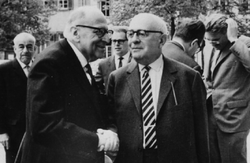Reason and Revolution
.jpg) Cover of the first edition | |
| Author | Herbert Marcuse |
|---|---|
| Country | United States |
| Language | English |
| Subject | Georg Wilhelm Friedrich Hegel, Karl Marx |
| Published | 1941 (Oxford University Press) |
| Media type | Print (Hardcover and Paperback) |
| Pages | 431 (1970 Beacon Press edition) |
| ISBN | 0-8070-1557-1 |
Reason and Revolution: Hegel and the Rise of Social Theory is a 1941 book by philosopher Herbert Marcuse, in which Marcuse discusses the social theories of Georg Wilhelm Friedrich Hegel and Karl Marx. Marcuse reinterprets Hegel, with the aim of demonstrating that "Hegel's basic concepts are hostile to the tendencies that have led into Fascist theory and practice."[1]
Summary
Marcuse discusses the social and political ideas of Hegel,[2] and attempts to show that "Hegel's basic concepts are hostile to the tendencies that have led into Fascist theory and practice."[1] Marcuse criticizes the thesis, propounded by Leonard Trelawny Hobhouse in The Metaphysical Theory of the State (1918), that Hegel provided an ideological preparation for German authoritarianism,[3] making the case that Hegel was a revolutionary.[4] Marcuse also discusses the philosophical basis of Marx's thought,[5] and provides an account of Marx's notion of labour.[6] In an appendix to the 1960 edition, Marcuse states that the "only major recent development in the interpretation of Hegel's philosophy is the postwar revival of Hegel studies in France." Marcuse credits the new French interpretation with showing clearly the "inner connection between the idealistic and materialistic dialectic". He provides a list of key works, including Alexandre Kojève's Introduction to the Reading of Hegel (1947).[7]
Scholarly reception
Psychoanalyst Erich Fromm praised Reason and Revolution in his Marx's Concept of Man (1961), calling it "brilliant and penetrating" and "the most important work which has opened up an understanding of Marx's humanism".[5] Jean-Michel Palmier sees the work as rejection of Marcuse's Hegel's Ontology and the Theory of Historicity (1932), an interpretation of Hegel influenced by Martin Heidegger. Philosopher Seyla Benhabib criticizes Palmier in her introduction to her translation of that work, arguing that while Marcuse pays much greater attention to Hegel's Elements of the Philosophy of Right (1820) and Lectures on the History of Philosophy (1825-6) in Reason and Revolution than in his previous work on Hegel, "the concept of Bewegtheit, which characterizes the movement intrinsic to all being, is clearly at the origin of the concept of negativity" prominent in the former work.[8]
References
- 1 2 Marcuse, Herbert (1970). Reason and Revolution. Boston: Beacon Press. p. xv. ISBN 0-8070-1557-1.
- ↑ Singer, Peter (2001). Hegel: A Very Short Introduction. New York: Oxford University Press. p. 124. ISBN 0-19-280197-X.
- ↑ Marcuse, Herbert (1970). Reason and Revolution. Boston: Beacon Press. p. 390. ISBN 0-8070-1557-1.
- ↑ Robinson, Paul (1990). The Freudian Left: Wilhelm Reich, Geza Roheim, Herbert Marcuse. Ithaca and London: Cornell University Press. p. 152. ISBN 0-8014-9716-7.
- 1 2 Fromm, Erich (1975). Marx's Concept of Man. New York: Frederick Ungar Publishing Co. pp. ix, 74. ISBN 0-8044-6161-9.
- ↑ McLellan, David (1995). Karl Marx: A Biography. London: Papermac. p. 444. ISBN 0-333-63947-2.
- ↑ Marcuse, Herbert (1970). Reason and Revolution. Boston: Beacon Press. p. 420. ISBN 0-8070-1557-1.
- ↑ Benhabib, Seyla; Marcuse, Herbert (1987). Hegel's Ontology and the Theory of Historicity. Cambridge, Massachusetts: MIT Press. pp. xxxii, xl. ISBN 0-262-13221-4.
External links
- marxists.org - the book
- marcuse.org listing with full texts of 19 reviews and links to on-line excerpts
